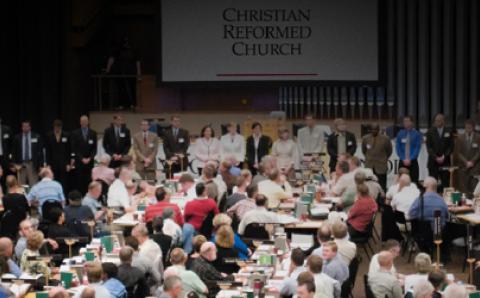Church
Q. In Genesis 4:14 Cain says, "I will be a restless wanderer on the earth and whoever finds me will kill me.” Who were the people Cain was worried about?
A. Your question raises the much broader question of how we are to understand the first 11 chapters of Genesis. Because we’ve taught that these chapters report historically factual events, we explain this story as follows: Even though Genesis 4 mentions only three of Adam and Eve’s children—Cain, Abel, and Seth—Genesis 5:4 tells us that Adam “had other sons and daughters.” When Genesis 4:17 mentions Cain’s wife, we assert that he married one of his sisters. Cain, the person who killed his own brother, is now afraid that his extended family will retaliate by killing him.
Another possible interpretation is that the stories in the early chapters of Genesis teach us truths about our relationship to God, others, and ourselves even though, like the story Jesus told of a Good Samaritan, the events described did not historically take place. Then, asking for the identification of the people Cain feared is like asking for the names of the priest and the Levite in the story of the Good Samaritan.
Recent discussions of creation raise the same issue (see the Feb. 2011 Banner, pp. 10-11). Scripture reports that God formed a man and every animal and bird from dust (Gen. 2:7, 19). Typically we’ve said that those words tell us how God created. Principles of biblical interpretation and recent scientific discoveries about the formation of the world and its inhabitants indicate that the words of Genesis can be interpreted in another way. To people who believed in many gods, the writer is proclaiming that God is the Creator of everything and that human beings have a relationship to this God different from all the rest of creation because they are created in God’s “own image” (Gen. 1:27). Such an interpretation does not deny the words of Scripture or the Confessions (see Belgic Confession Article 14) but understands those words in ways we have not traditionally explained them.
—George Vander Weit
Christian Morality
Q. When I express frustration with my husband, he frequently says that I am scapegoating him—blaming him for something that is the fault of others—and points out that scapegoating is a sin. Can you help me better understand scapegoating?
A. I believe your husband is confusing a scapegoat with a different biblical metaphor—that of a sacrificial lamb.
The term “scapegoat” derives from an Old Testament practice in which the high priest lays his hands on a goat that is chosen by lot and, under the belief that the guilt of the people has been transferred to the goat, he turns the goat loose in the wilderness (Lev. 16:8-10).
Modern usage of the term does not presuppose that a transference of guilt takes place. Nor does it connote the complete lack of complicity characteristic of the goat. Modern usage involves the idea that one person is exaggerating the degree to which another is morally blameworthy for a state of affairs, thus understating the extent to which others contributed to it. The scapegoat bears some degree of moral blame for the state of affairs, but he or she is being blamed out of proportion to what is deserved.
When a perfectly innocent person is selected to bear the blame for what happens, the term “sacrificial lamb” is appropriate. When someone is described as a sacrificial lamb there is no presumption that that the person bears any blame for the situation in question.
Suppose several children leave their Popsicle wrappers and sticks lying on the grass. If an angry adult points out the litter, the one child who is still present receives an inordinate amount of the blame. The child is a scapegoat because he is being blamed for what others did in addition to what he did. But he qualifies as a sacrificial lamb if he had no Popsicle in the first place.
If you are truly making a scapegoat of your husband, he cannot rightly claim that what happened is completely the fault of others. Because the Bible is so important to us we need to have healthy discussions about these matters, discussions in which we acknowledge each other as fellow believers who respect God’s Word.
—Gregory Mellema
About the Authors
George Vander Weit is a retired pastor in the Christian Reformed Church.
Dr. Gregory Mellema is a philosophy professor at Calvin College in Grand Rapids, Mich.








